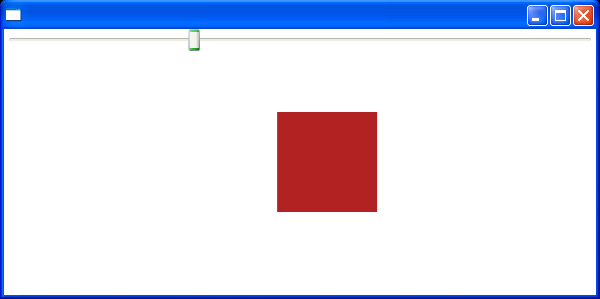Control the Progress of an Animation

<Window x:Class="WpfApplication1.Window1"
xmlns="http://schemas.microsoft.com/winfx/2006/xaml/presentation"
xmlns:x="http://schemas.microsoft.com/winfx/2006/xaml"
Title="" Height="300" Width="600">
<Grid>
<Rectangle x:Name="Rectangle" Height="100" Width="100" Fill="Firebrick">
<Rectangle.RenderTransform>
<MatrixTransform x:Name="RectangleMatrixTransform" />
</Rectangle.RenderTransform>
<Rectangle.Triggers>
<EventTrigger RoutedEvent="Rectangle.Loaded">
<BeginStoryboard x:Name="RectangleStoryboard">
<Storyboard x:Name="Storyboard" CurrentTimeInvalidated="Storyboard_Changed">
<MatrixAnimationUsingPath Storyboard.TargetName="RectangleMatrixTransform" Storyboard.TargetProperty="Matrix" Duration="0:0:10"
RepeatBehavior="Forever">
<MatrixAnimationUsingPath.PathGeometry>
<PathGeometry Figures="M -100,0 300, 0" />
</MatrixAnimationUsingPath.PathGeometry>
</MatrixAnimationUsingPath>
</Storyboard>
</BeginStoryboard>
</EventTrigger>
</Rectangle.Triggers>
</Rectangle>
<Slider x:Name="Seeker" Minimum="0" Maximum="1" SmallChange="0.001" ValueChanged="Seeker_ValueChanged">
<Slider.Triggers>
<EventTrigger RoutedEvent="Slider.MouseLeftButtonDown">
<StopStoryboard BeginStoryboardName="RectangleStoryboard" />
</EventTrigger>
<EventTrigger RoutedEvent="Slider.MouseLeftButtonUp">
<ResumeStoryboard BeginStoryboardName="RectangleStoryboard" />
</EventTrigger>
</Slider.Triggers>
</Slider>
</Grid>
</Window>
//File:Window.xaml.cs
using System;
using System.Windows;
using System.Windows.Media.Animation;
using System.Windows.Input;
namespace WpfApplication1
{
public partial class Window1 : Window
{
public Window1()
{
InitializeComponent();
}
private void Storyboard_Changed(object sender, System.EventArgs e)
{
ClockGroup clockGroup = sender as ClockGroup;
AnimationClock animationClock = clockGroup.Children[0] as AnimationClock;
if (animationClock.CurrentProgress.HasValue)
{
Seeker.Value = animationClock.CurrentProgress.Value;
}
}
private void Seeker_ValueChanged(object sender, RoutedPropertyChangedEventArgs<double> e)
{
Storyboard.Seek(Rectangle,
TimeSpan.FromTicks((long)(Storyboard.Children[0].Duration.TimeSpan.Ticks * Seeker.Value)),
TimeSeekOrigin.BeginTime);
}
}
}
Related examples in the same category